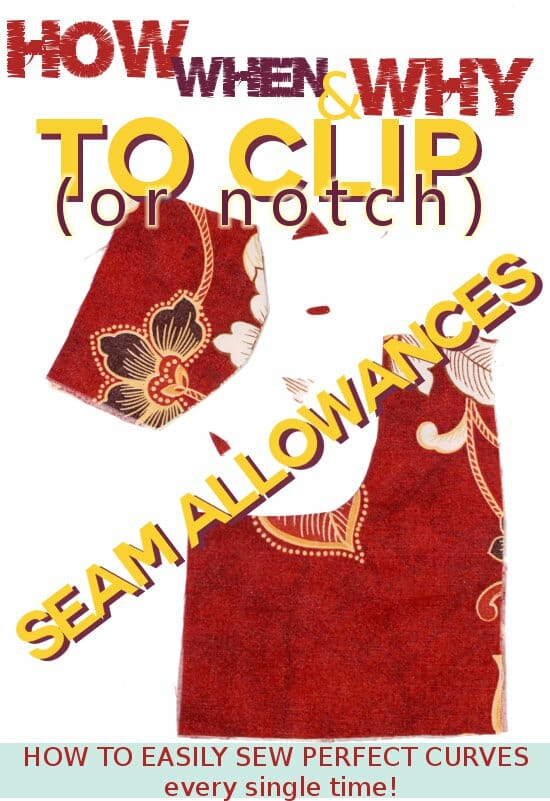
If you have ever read instructions from a sewing pattern which included any curved seam, you've certainly been asked to “clip (or notch) seam allowances”.
If they were your first steps in sewing, I bet you stopped a while to figure out what you had to do… and maybe you're still there, wondering what you needed to do and why?
Go on reading my “how-to clip (and notch)” guide and never skip this important step again!
When should you clip your seam allowances?
When you're sewing a concave curve (C-shaped valleys) or inside corners (think welt pockets, zipper pocket slots, squared necklines…).
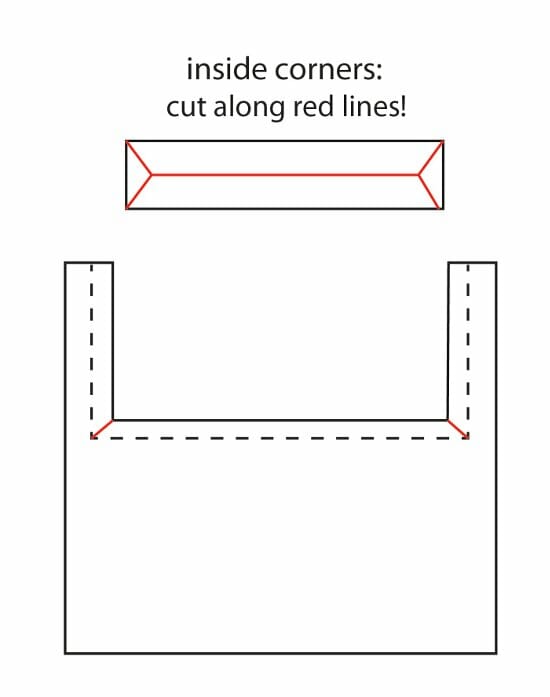

On a garment, you'll likely need to clip seam allowances on necklines, facing, armholes, hip pockets: mostly curved seams!
Why do you need to clip?
To allow the fabric's raw edge to stretch enough to lay flat, without pulling the seam, when you turn it right side out, press the fold on the fabric, along that seam. Not enough slits and you'll get a badly buckled edge!
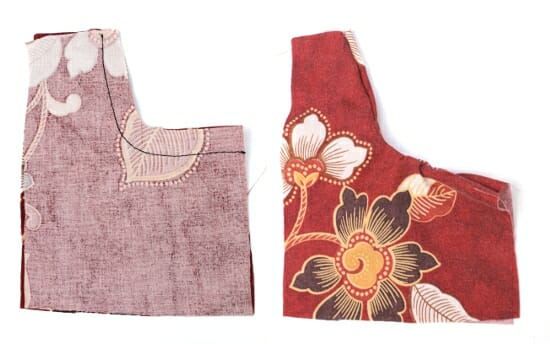

Not sure it's that bad? Let's see it better: awful! It will never lay flat, no matter how much you press it!
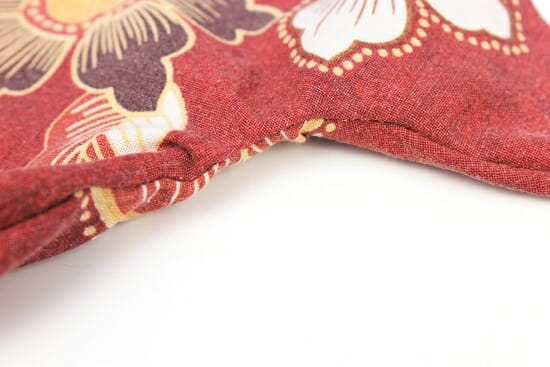

…unless we know:
How to clip
You can do it perpendicularly or 45° to the seam line (and anything in between).
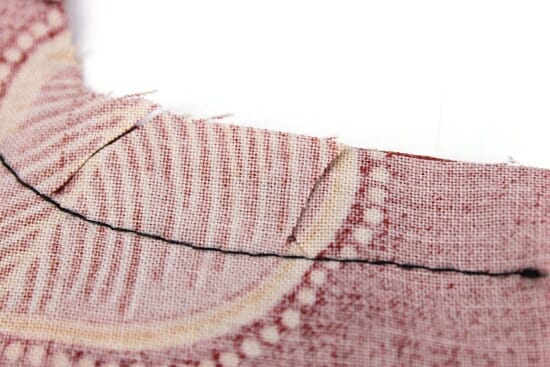

Although clipping both seam allowances together, in one only cut, will work just fine in most situations, with heavyweight fabrics I'd suggest you try clipping each seam allowance separately, in opposite directions: less bulk, more strength retained!
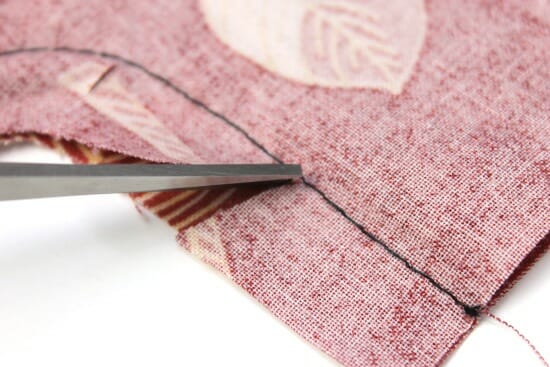

Clip close to (but not through) the seam: try to stay just one thread away from it!
Here you want/need to have scissors with sharp tips, to be sure you have perfect control over where you're cutting!
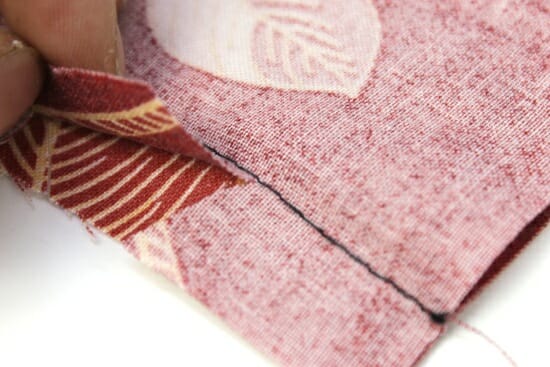

Depending on how steep a concave curve is, you can clip more or less frequently. Run a test if you're in doubt, sewing a mock-up of the curved and clipping it to determine how much you need to clip it, finding the balance.
Sew your concave curve, clip every now and then, turn right side out and stare at the seam allowance spreading evenly on the inside… it's a kind of magic!
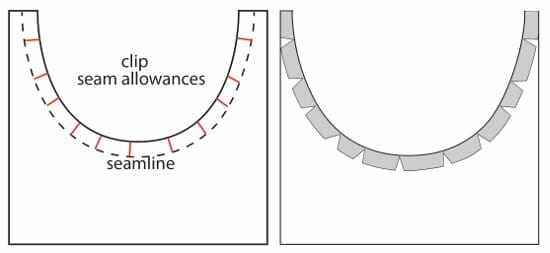

Don't think that more is better: too much can weaken your seam, ending on a breakage.
By the same token, Never Ever cut out triangular notches when sewing C-shaped concave valleys curves!
Wait… notches? What are they?
Let's talk about notches!
When you are going to sew the opposite kind of curve, something that looks like a mountain (technically, we can call it a convex curve, D-shaped, belly-style curve! Ok, this last one isn't that technical, but it works ;)), you need to act in a different way: clipping seams won't be enough, you need to notch!
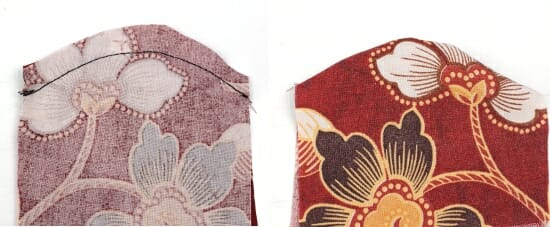

Notch is a V-shaped cut that reduces the length of the seam allowance raw edge when turned right side out. You can do it in two steps (cutting each side of the triangle separately, or in one cut, folding the fabric and snipping it through 4 layers: this works best for lightweights).
It's hard to see the problem from the outside of the fabric, let's see the seam allowances bunching up in the inside, to clearly determine that there's too much unwanted exceeding fabric that we need to get rid of: this is just because the raw edge is longer than where it should sit.
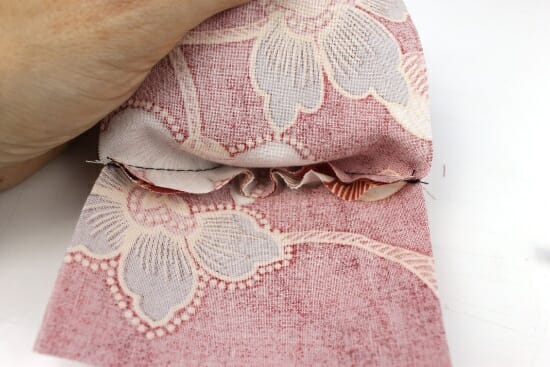

Cutting away little triangles, either on both seam allowances together or independently…
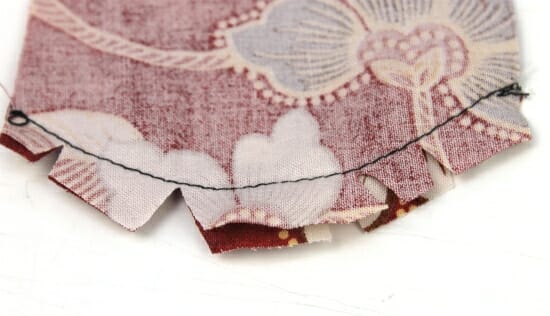

… the raw edge will perfectly fit: ta-dah!
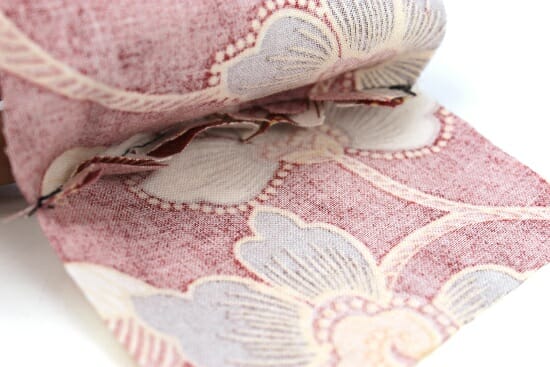

Here is what happens: you sew the convex curve, cut out your notches, then turn right side out and see the magic happens! The fabric isn't bunching up, no more!
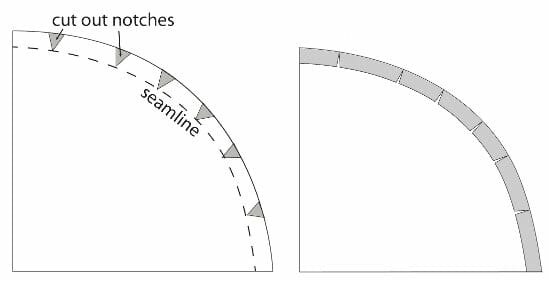

Level-up: bonus tips
Before clipping your seam allowances, I'd suggest you to trim them to around 3/8″ or less. You can also grade them (leaving the garment seam allowance larger and the facing one slightly narrower, somewhere between 1/4″ and 1/8″) to smoothly reduce the bulk. Use pinking shears to reduce the bulk even more, and more evenly. This is helpful especially with heavyweight fabrics: test with your fashion fabric to decide what works best.
My rule #1 is: don't do it, if you don't need to (or: save time whenever you can!)
Caution!!!
Be sure you won't need to let that seam out: if you're sewing a garment, you'd better try it on before you clip the seam allowances, to be sure it's not too tight!
Clipping/notching are one-way streets!








Love the post, incredible useful and very technique but keeping simple for the understanding of the whole community! Thanks a lot for all your help!!
Can you please explain why you said “never ever cut out triangular notches when sewing c-shaped Concaved valleys curves”? Thank you! Love your sewing tips and tricks!
What about when you use a Serger?
SUA DICA AJUDOU MUITÍSSIMOS!
OBRIGADA.
o prazer de te ajudar 🙂
After many, many years of sewing and even a tailoring class or two, why did I not know this? Even looked back through class notes and no comments recorded about this huge difference. I was always just told to clip, clip, clip! Thank you so much!
excellent precise info!
[…] How, when and why to clip seam allowances […]
Very helpful for sure, happy to have found this site. Wondering though, aren’t I supposed to zig-zag all raw edges to keep from fraying? Is this then the exception to that rule (sorry, I’m pretty much a complete newbie to sewing!)
Hi Jocelyn, it depends what you are doing, clipping seam allowances reduces the bulk of corners and allows the pieces to take better shape, if the seam is not going to be seen as in a Peter Pan collar is not necessary to zig zag but imperative to clip the seam allowance.
Thanks, great info for us all to remember.
Pinking shears work wonders for both clips and notches, and it’s much easier to do. I think this tip was in Threads Magazine long ago.
Clip the valleys and notch the hills!
Putting it that way makes it so easy to remember. Gratitude and Respect.
What a great saying to remember when to clip and when to notch!
Great post. Thanks so much. I’m trying to think of a way to remember when to cut and when to notch. You know those handy little rhymes or jingles to help your memory out? Can’t think of one for the peaks and valleys. Any ideas?
Clip the valleys and notch the hills! as Mrs K Stephen suggested! 😉
Very informative! Love the diagrams! 🙂 Lisa
Instead of clipping use a smaller seam allowance, 1/4″ for necklines and 3/8″ for facings. Also, on tighter curves use pinking shears to trim and a shorter stitch. You rarely see clipped curves in ready to wear.